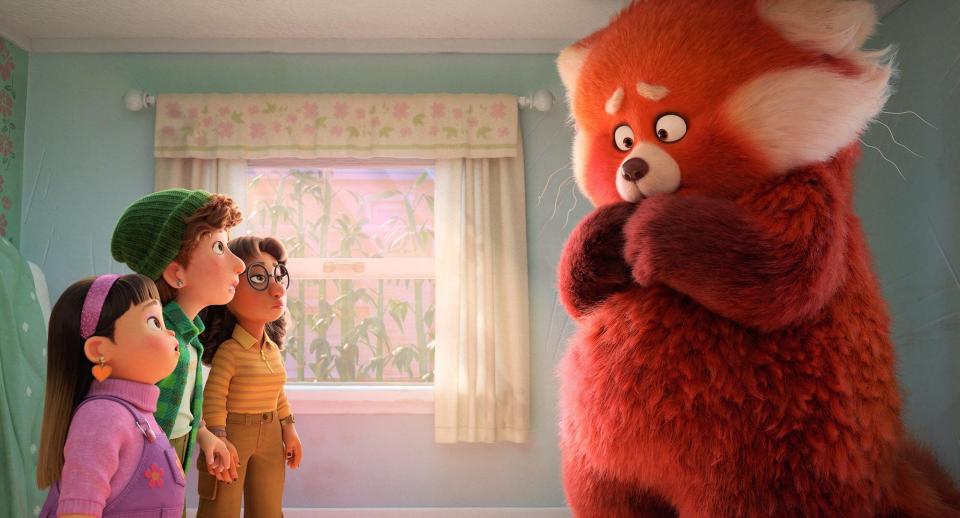Turning Red review: Pixar grows up, gets panda'd in its joyful tween-centered latest
- Oops!Something went wrong.Please try again later.
Has there ever been a better metaphor for puberty than a feral, rampaging animal? Like other teen wolves before her, Meilin Lee, voiced by Rosalie Chiang, can't help manifesting her feelings literally in claws and fur. Unlike them, the small hormonal heroine of Turning Red (on Disney+ March 11) has the full imaginirium of Pixar behind her — not perhaps the studio anyone expected to be speaking directly to crushes, periods, and parents who just don't understand, though a project like Red seems almost inevitable now that it's here. Their audience, after all, is continuously growing up; why shouldn't their movies?
For reasons that go unexplained (maybe it's to eliminate the specter of social media and cell phones), the story is set in 2002 Toronto, where Mei, bespectacled and freshly 13, lives with her constantly hovering mother Ming (Sandra Oh) and more amiable father Jin (Orion Lee) in a courtyard complex that also houses one of the city's oldest temples. Ming is a classic tiger mom, but Mei doesn't seem to mind; she loves studying and getting good grades and helping to prepare the temple for visitors. She also loves her friends, a motley crew mildly perplexed by her good-girl loyalties.

Disney/Pixar 'Turning Red'
For Mei, honoring her parents has simply never come into question: "They're the supreme beings who gave you life…. The least you can do in return is every single thing they ask." But there are forces simmering beyond her control, and when Ming brusquely shuts down her plea to see her favorite dreamboat boy band in concert and then inadvertently humiliates her in front of a leering group of classmates, Mei's ancestral DNA takes over. It turns out that some form of red-panda transmogrification is a family legacy, and whenever Mei feels too much — anxiety, excitement, rage — she pandas all over the place.
Body-swap shenanigans inevitably ensue, and Red revels in the chance to show off its various Pixar tricks: The original songs, by Billie Eilish and her brother Finneas, are high-gloss earworms, and the script, by Julia Cho (Big Love, Halt and Catch Fire) and director Domee Shi sparkles and zips. Small details gleam from the corners — the rippling beta-carotene richness of each furry panda filament; the excitable sidekick (Hyein Park) so tightly wound that even her affirmations come out like a WWE scream. Like last year's Raya and the Last Dragon and Shang-Chi and the Legend of the Ten Rings, though, the movie is maybe most notable for how naturally it forefronts and celebrates Asian culture, and the easy equality with which it treats its female characters.
Shi, who won an Oscar in 2019 for her animated short Bao, is actually the first solo woman to helm a Pixar feature, which may be why its portrayal of girlhood on the verge feels as true as it does, even as a cartoon; she captures the tsunami of heightened feelings that makes everything matter so much in adolescence, without judging or making fun. She also roots Mei's story engagingly in family ritual — the Lees hand-shaping dumplings for dinner or lighting incense for their ancestors as a matter of course, not calculated exoticism or lesson-teaching. The story can be silly and sometimes vaguely anachronistic (did the kids really exclaim "Oh.Em.Gee." or speak in the confident parlance of self-actualized TikTok teens back in 2002?), but Red is so breezily charming that hardly matters. In the tricky world of tween-dom, it captures something sweetly universal: Growing up is messy, no matter how you bear it. Grade: B+
Related content:

